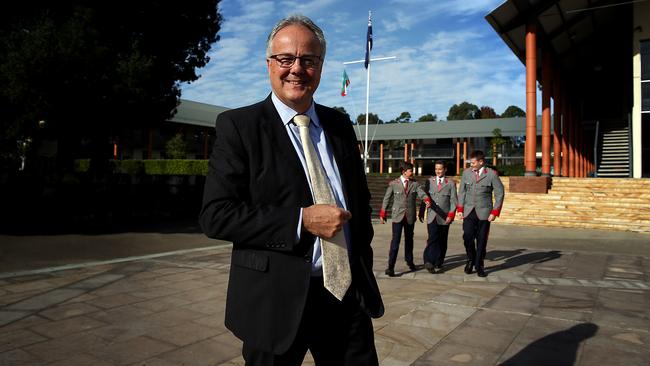‘Homework grid’ strategy to give kids daily chores and tasks
A Sydney primary school is trialling a new approach to homework, giving students a month to complete assigned work instead of wasting time revising in their rooms for hours.

NSW
Don't miss out on the headlines from NSW. Followed categories will be added to My News.
Sweeping the floor, taking the bins out and “dancing like there’s no tomorrow” is all considered homework in a radical new approach being trialled at Sydney primary schools.
The “homework grid” strategy requires children to perform household chores and reading and spelling tasks every day but gives them up to a month to complete maths, science and technology tasks.
Program mastermind, mathematics teacher turned academic Dr Ian Lillico, believes sending kids to their rooms for hours to revise what they learned in school is a waste of time and they would be better served getting outside or learning life lessons.

MORE FROM JACK MORPHET
DUST STORM TURNS DAY INTO NIGHT
Dr Lillico, who has advised governments on teaching boys, wants to “dismantle old-fashioned homework”. He says it is a “major contributor” to children’s increasing obesity, poor relationships with parents, inability to manage time and addiction to digital devices.
“Homework for homework’s sake has been a device parents have devised to keep kids quiet or under control,” Dr Lillico said.
“Children must do work around the home and contribute to family life rather than sitting in a room for two hours a night on gadgets, when they’ve already been sitting for six hours a day.”
Dr Lillico is trying to convince primary principals, who are solely responsible for their school’s homework policy and don’t need approval from the education department or the Education Standards Authority (NESA).

Schools using the “homework grid” or its principles include St Ives Public School, Lane Cove Public School and Willoughby Public School. Gladesville Public School primary students trialled the “homework grid” method for the second half of past year.
Surveys taken by Gladesville showed teachers and students were overwhelmingly supportive of the new principals, but most parents weren’t convinced and would prefer homework went back to basics.
Teachers and parents will meet early in Term 1 this year to decide whether or not to adopt the “homework grid” method.
Father Kaylen Brown, whose daughter Maia, 6, will enter Year 2, hopes it gets the green light.

“Kids this young spend enough time sitting in the classroom and learning,” Mr Brown said.
“When they get home, it’s important they get outside and keep fit or learn life lessons like making their bed, which they’ll need for the next 85 years or more.
“A monthly homework timetable not only helps them manage their time, but suits the family better because there are times when we’re at a birthday party after school and Maia doesn’t have time for homework.”
Recently tired headmaster of The King’s School and education consultant Dr Tim Hawkes agreed the value of homework increased with age but warned of creating a generation of children who can’t hack tedious work.
“The discipline of hard work is endangered enough in society without our contributing to it by removing the requirement to do homework,” Dr Hawkes said.

According to Dr Hawkes, schooling typically takes up 13 per cent of kids’ waking hours in the first 18 years of their lives and “extending students a little by setting homework should not result in their sky falling in”.
“Not all learning can be made frolicking good fun and our young need to deal with this truth,” he said.
“Proficiency in playing a musical instrument will only come after many hours of purposeful practise.”
Dr Hawkes baulked at the suggestion homework was making kids fat, suggesting eating less junk would have a far greater impact.
Originally published as ‘Homework grid’ strategy to give kids daily chores and tasks



